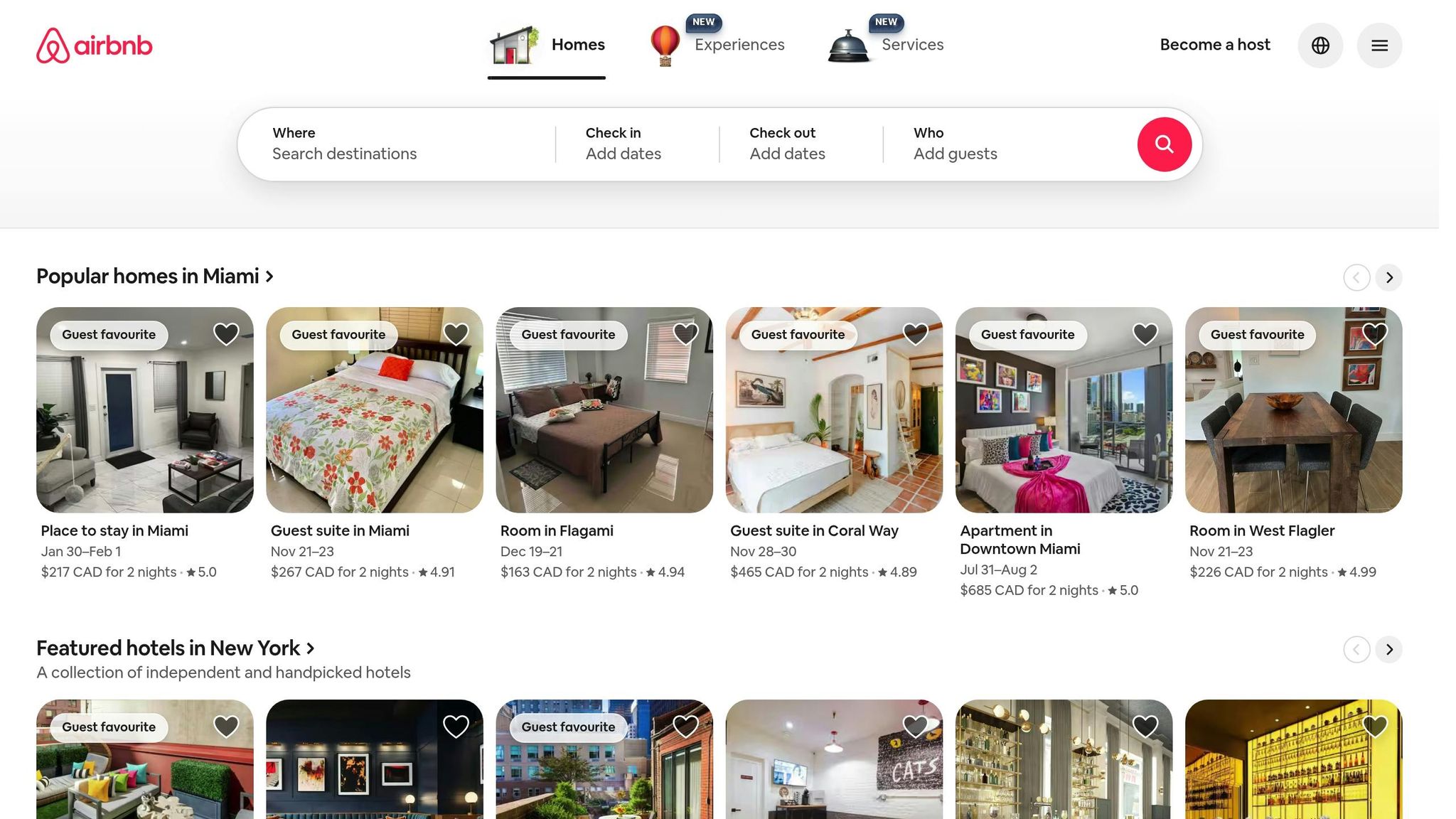Managing a short-term rental in Nova Scotia can be challenging. Whether it’s tracking earnings, ensuring timely payments, or maintaining clear communication, property owners often face hurdles. This guide simplifies these concerns, offering practical solutions for financial reporting, payout reliability, and guest communication.
Key Takeaways:
- Financial Clarity: Use tools like Casa Scotia’s owner portal for real-time income tracking, HST calculations, and compliance with Canadian standards.
- Payout Timing: Monthly payments via direct deposit streamline cash flow, while detailed statements outline fees and income.
- Communication Best Practices: Proactive guest interactions, detailed house manuals, and regular check-ins with property managers improve experiences and avoid misunderstandings.
By focusing on these areas, you can boost earnings, improve guest satisfaction, and navigate Nova Scotia’s unique rental landscape with confidence.
How to Find Your Airbnb Earnings Report For Tax Purposes | Hosting Tips

Financial Reporting for Nova Scotia Property Owners
Keeping financial records accurate and up-to-date is crucial. Without a clear picture of income and expenses, decisions about pricing, upgrades, or investments can feel like a shot in the dark. For property owners in Nova Scotia, reliable reporting systems are a must - not just to monitor performance but also to comply with local regulations and Canadian financial standards. Let’s dive into how Nova Scotia property owners can manage these financial responsibilities effectively.
Nova Scotia Financial Reporting Requirements
If you operate a short-term rental in Nova Scotia, maintaining detailed financial records isn’t optional - it’s a requirement. You’ll need to track all rental income, which includes not just nightly rates but also cleaning fees, damage deposits, and any additional charges. On the expense side, make sure to record costs like cleaning supplies, maintenance, management fees, and utilities. These records are essential for calculating net rental income and claiming eligible deductions when tax season rolls around.
How Casa Scotia's Reporting Tools Work

Casa Scotia simplifies financial reporting through its owner portal, which provides real-time, monthly financial reports. These reports break down income sources, automatically track expenses, and highlight occupancy trends. Even better, they calculate net earnings after all fees, giving you the insights needed to adjust pricing or marketing strategies quickly.
The portal also minimizes manual work by automatically importing reservation details and transactions, which not only saves time but also reduces the risk of errors. With everything organized in one place, you can focus more on running your property and less on crunching numbers.
Canadian Reporting Standards: Currency, Dates, and Units
Casa Scotia’s reporting tools follow strict Canadian formatting to ensure clarity and compliance. Here’s what that looks like:
- Currency: All amounts are in Canadian dollars (e.g., $1,234.56).
- Dates: Reports use the YYYY-MM-DD format, such as 2025-03-15.
- Units: Measurements are in metric, including square metres, with square feet noted where necessary.
- Temperature: Displayed in Celsius.
Additionally, the system automatically calculates HST where applicable and separates it from the base rental income. This feature makes tax filing much simpler by clearly showing gross and net figures. With these detailed breakdowns, you’ll always know how taxes and fees affect your bottom line.
Payout Processes and Timelines
Getting paid on time is crucial when managing your rental property, and Casa Scotia takes care of the entire process - from collecting guest payments to transferring funds. Below, you'll find an overview of how payouts work, the available payment methods, and what might affect the timing.
Standard Payout Procedures in Nova Scotia
When a guest books your property, Casa Scotia collects the payment and processes it through several verification steps before preparing it for payout. Fees and taxes associated with the booking will appear on your monthly statement. It’s worth noting that the time it takes for funds to reach your account can vary depending on your financial institution’s processing times.
Casa Scotia's Payout Schedules and Payment Methods
Payments for completed bookings are consolidated into a single monthly transfer. This comes with a detailed statement outlining your gross income, fees, and taxes, all in Canadian dollars.
For convenience and speed, direct deposit to a Canadian bank account is recommended. To set this up, you’ll need to provide your institution, transit, and account numbers. If you prefer, cheque payments are also an option, but keep in mind they might take longer due to additional processing time.
Factors That May Impact Payout Timing
Even with a structured system in place, delays can occasionally happen. Banking holidays or extra verification steps may sometimes slow things down. To keep you updated, Casa Scotia’s owner portal provides real-time information on your payout status, so you can quickly see if there are any changes or delays.
sbb-itb-b5e1074
Clear Communication with Guests and Property Managers
Keeping communication clear and consistent is essential for smooth operations. It ensures guests feel supported and aligns expectations with your property management team. By setting expectations early and staying in touch throughout, you can create a seamless experience for everyone involved.
Guest Communication Best Practices in Nova Scotia
According to Touch Stay's 2023 study, 69% of guests are more likely to leave a positive review when communication is clear, while minimal contact often leaves them feeling unsupported. Interestingly, guest satisfaction tends to peak when hosts send three to five messages during a stay[1].
A well-prepared house manual can be your secret weapon for effective communication. Include straightforward instructions for using appliances, managing heating, and handling emergencies, alongside local recommendations. Address common questions upfront - such as how to adjust the thermostat, locate the circuit breaker, access Wi-Fi, or find dining options. Additionally, screening guests and clearly outlining house rules (like noise policies, parking restrictions, and other guidelines) before they book can help avoid misunderstandings and attract guests who align with your property’s expectations.
Casa Scotia's Communication Approach
Casa Scotia takes a proactive stance when it comes to guest communication, ensuring a smooth experience from the initial inquiry to post-stay feedback. Their team carefully screens guests to confirm they understand and agree to house rules before booking - a step that helps minimize potential problems.
During a guest's stay, Casa Scotia's local team is quick to respond to any questions or concerns. They also provide real-time updates through the owner portal, keeping you informed about key interactions and feedback. From overseeing checkout procedures to gathering post-stay insights, Casa Scotia ensures all feedback is incorporated into monthly reports. These reports can help you stay on top of trends and identify areas where improvements might be needed.
Working Effectively with Property Managers
Strong communication with property managers and service providers is crucial for aligning expectations and keeping operations running smoothly. Set up regular check-ins to review property conditions, maintenance needs, and booking performance. It’s also important to define clear response times for various situations - emergencies may require immediate attention, while routine matters can follow standard business hours.
Documenting key decisions, such as updates to house rules, pricing strategies, or property features, helps maintain consistency and avoid misunderstandings. Regular property visits or quarterly walk-throughs can further strengthen your connection to the property. These check-ins allow you to address recurring issues and explore opportunities for improvement with your management team.
Conclusion: Building Trust Through Clear Processes and Local Knowledge
Thriving in Nova Scotia's short-term rental market hinges on three key pillars: precise financial reporting, dependable payout systems, and open communication. When these elements align, property owners can zero in on their priorities - boosting returns and creating memorable guest experiences.
For many property owners, navigating financial reports, payout schedules, and consistent communication can feel like an uphill battle. However, clear and well-structured systems transform these hurdles into opportunities. Properties with transparent practices not only appeal to higher-quality guests but also tend to earn better reviews, leading to steady revenue streams.
This is where Casa Scotia steps in. Their system simplifies these essential processes, offering tools like an owner portal with real-time updates and detailed monthly reports. Beyond that, their platform handles guest screening and ensures compliance with local regulations. By combining professional property staging, multi-platform marketing, and an in-depth understanding of the local market, Casa Scotia lays the groundwork for long-term success.
In Nova Scotia, local expertise is a game-changer. Knowing the region’s seasonal trends, preferences, and regulatory landscape gives property owners a distinct advantage. When paired with robust financial systems and effective communication, this local know-how becomes the backbone of a thriving short-term rental business. It’s these insights that shape every successful guest interaction.
Trust is the glue that holds everything together - trust between guests, property managers, and service providers. Consistency in transparency leads to better guest experiences, repeat bookings, word-of-mouth referrals, and, ultimately, sustained profitability.
FAQs
What do I need to do to meet Nova Scotia's financial reporting requirements for my short-term rental?
To meet Nova Scotia's financial reporting rules for short-term rentals, you’ll need to follow the Short-term Rentals Registration Regulations under the Short-term Rentals Registration Act. This involves steps like registering your property, paying any required annual registration fees, and keeping detailed records of all rental income.
Staying informed about updates to provincial regulations and maintaining well-organized financial records is essential. Clear documentation not only helps you stay compliant but also simplifies the entire process for you as a property owner.
What should I do if my payout from Casa Scotia is delayed?
If your payout hasn’t arrived on time, start by reviewing your account details on the Casa Scotia platform. Double-check that all your payment information is accurate and up to date. Sometimes, delays happen because of incorrect banking details or processing issues.
If your details look correct, the next step is to contact Casa Scotia’s support team. Be ready to share key information like the payout reference, the expected amount, and the due date. This will help them investigate the issue more efficiently and get back to you with an update.
To reduce the chances of future delays, make it a habit to keep your banking information updated and keep an eye on your payout schedule. While most payouts are processed within the standard timelines, occasional delays can occur due to factors like bank holidays or other external circumstances.
How can I communicate effectively with guests to enhance their stay and encourage positive reviews?
When it comes to interacting with your guests, clarity, transparency, and quick responses are key. Start by sharing accurate, detailed information about your property. Highlight amenities, outline house rules, and mention nearby attractions to set clear expectations.
It’s equally important to maintain a polite and professional tone in all your messages. Whether you’re answering questions or addressing concerns, being timely and respectful can make a big difference.
During their stay, a quick check-in message to ensure everything is going smoothly can show that you care. Something as simple as, “I hope everything is going well! Let me know if you need anything,” can make guests feel at ease. Once their visit is over, take the time to thank them for choosing your property and encourage them to share their feedback. This not only builds trust but also helps you refine your hosting approach.
By keeping communication open and respectful, you create a welcoming atmosphere that makes guests feel appreciated - and increases the chances of earning glowing reviews.
Related Blog Posts
- Short‑Term vs Vacation Rental: What Does “28 Days or Less” Really Mean?
- St. Margaret’s Bay, Tantallon and Hubbards: STR Rules, Seasonality and Host Tips
- Head of Jeddore, Sheet Harbour and Taylor Head: Rural STR Compliance and Guest Profiles
- Nova Scotia STR Launch Checklist: From Zoning Confirmations to First Booking



